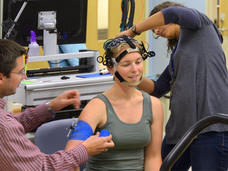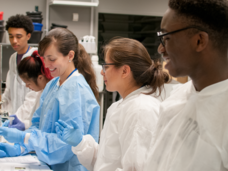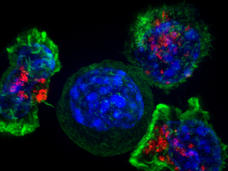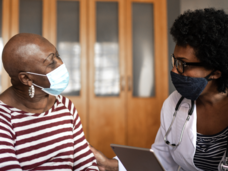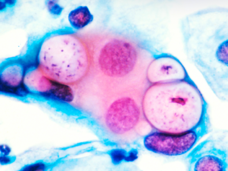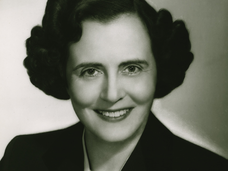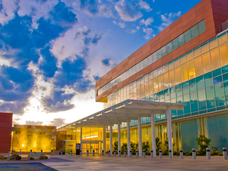What the National Cancer Act Made Possible
Just as every cancer is unique, so too are the stories of the people and events that have transformed cancer research and care. They are the pioneers of advocacy, the researchers and scientists discovering new treatments and prevention approaches, and the doctors who deeply care about improving the lives of their patients. They are the social workers, patient educators, administrators, and technicians. Most importantly, they are the patients, who are also our friends, family, and sometimes even ourselves.
-
Identifying What Puts People at Risk for Cancer
Environmental, behavioral, familial, and genetic factors can all play a role in determining someone’s risk for cancer. Through ongoing research, our understanding of these risk factors and their connection to this disease continues to evolve and along with it, our ability to better prevent, diagnose, and treat cancer.
-
The Tech Revolutionizing Cancer Research and Care
What once seemed impossible in cancer research is now a reality thanks to a number of technological innovations that have led to breakthroughs in the ways we find, visualize, understand, and treat cancer. Continuing to explore and use these technologies can open the door to accelerate progress against this disease.
-
The "Best" Cancer Is the One that Never Happens
Cancer affects millions of people each year, but it doesn’t have to be that way. From clinical trials to major public health campaigns, efforts to understand and communicate about cancer at every level are helping us refine prevention and screening methods, catch cancer sooner (and thus treat it sooner), and, ultimately, save more lives.
-
Improving Outcomes for All Children with Cancer
There have been great strides in childhood cancer research in the last 50 years, but there’s still a need for quicker progress to improve outcomes for all children with cancer. That’s why we’re advancing clinical trials through sharing data, making treatments less toxic, working to better the quality of life for patients and survivors, and performing the critical research needed to accelerate progress—all to give every child the best future possible.
-
A Diverse Workforce with a Shared Mission
Thousands of people, one goal: to end cancer as we know it. Whether it's at the bench or bedside, in a classroom or in an office, the dedicated individuals that make up the cancer research workforce are collaborating across disciplines, mentoring the next generation of diverse talent, and developing an inclusive pipeline, to propel cancer research into the future.
-
Offering Hope through Better Treatments and Care
Significant advances in cancer treatment in the past few decades have revolutionized care. With targeted therapies, new approaches and technologies, and improvements in conventional treatments like chemotherapy, research is moving forward in ways that are bringing hope to families and ensuring a better quality of life for more patients touched by cancer.
-
Cancer Research Starts Here
Much of the recent improvement in 5-year survival rates for all cancers combined is the result of discoveries across the past five decades that have shaped our understanding of what cancer is, its biological and social risk factors, and how it grows and spreads. Thanks to the individuals who perform this research, more lives have been saved and great strides were made in preventing, diagnosing, and treating this collection of diseases.
-
Eliminating Cancer Health Disparities Takes All of Us
The 1960s saw a surge in activism to end widespread institutionalized racism, including in health care, where little was being done to study and address disparities. Since then, progress has been made in areas like inclusive cancer data collection, community outreach, and organizational change within medical institutions. But as is evident from current social justice movements and the COVID-19 pandemic, disparities still exist and remind us how much is left to do to build a truly equitable society.
-
Accelerating Progress with the Power of Data
Collecting and securely sharing cancer research data is saving lives. It allows researchers to identify trends, patterns, and other insights that could be used to inform screening and treatment approaches, all while protecting patient privacy. And as we work to deliver on the promise of precision medicine, it’s exciting to witness the power of these data in improving outcomes for patients and families.
-
Clinical Trials Help Build the Future of Medicine
Clinical trials help inform our understanding of cancer and improve prevention, diagnosis, treatment, and care. But this progress could not happen without the people who take part in and those who connect people with trials. These professionals also work to ensure that people who need them have equal access to trials, with the goal of helping all people benefit from trials and their results.
-
Cancer Survivorship Is as Unique as the Survivor
There are nearly 17 million cancer survivors in the United States, and each will contend with the effects of their diagnosis and treatment in different ways. Personalized treatment options continue to be studied, but as the number of survivors keeps growing, research is also being devoted to finding ways to improve overall care and well-being so that survivors can go on to live longer, healthier lives.
-
Making Cervical Cancer a Thing of the Past
Cervical cancer kills 300,000 people globally each year, but it doesn’t have to be this way. With the human papillomavirus (HPV) vaccine and the advent of more convenient and accessible screening methods like self-sampling, it is now possible to prevent cervical cancer entirely or catch it early enough to cure it. And through partnerships with other countries, more clinical trial data are emerging that could further improve global prevention efforts so that we can get rid of cervical cancer for good.
-
Advocates and Allies: The Pioneers of Progress
Cancer advocates have a long history of making sure patients' voices get heard. In fact, one notable advocate had a major role in making the National Cancer Act a reality. Meet these not-so-silent allies of yesterday and today who challenge the status quo, push for progress, and accelerate change in the world of cancer.
-
Hope for Millions through Cancer Centers
NCI-Designated Cancer Centers provide breakthrough approaches to preventing, diagnosing, and treating all types of cancers. Today, there are 71 centers in 36 states that are composed of multidisciplinary teams that deliver cutting-edge research, clinical trials, and state-of-the-art treatment facilities to all Americans, including many underserved communities. Earning an NCI designation is an honor reserved for only the top cancer centers in the nation.
The National Cancer Act of 1971 was the spark that fueled the next 50 years of cancer progress. Created from the efforts of advocates, this investment in basic science and data compilation and sharing has contributed to an increased understanding of cancer biology—leading to new and improved therapies, and ultimately, more survivors. Cancer prevention, diagnosis, treatment, and care delivery are also reaching more people than ever through cancer centers, clinical trial networks, and community-based programs. The National Cancer Act signaled a nationwide commitment to cancer control and this landmark legislation has provided a foundation to help all of us as we continue in the fight against cancer.

